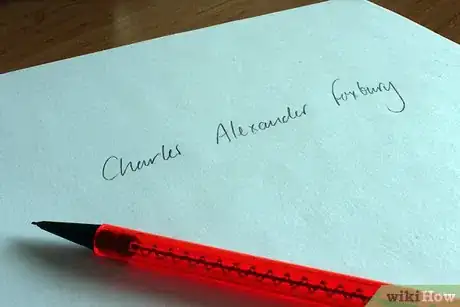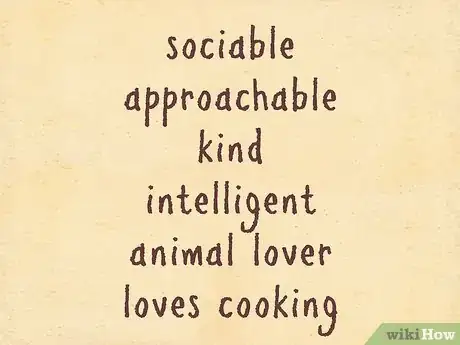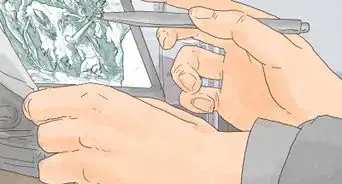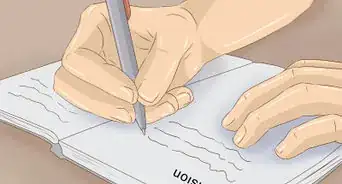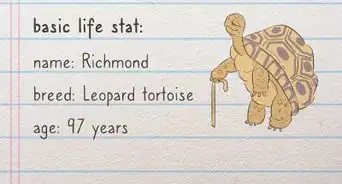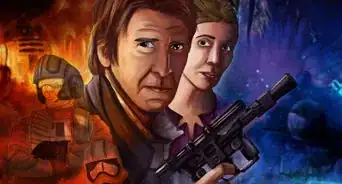wikiHow is a “wiki,” similar to Wikipedia, which means that many of our articles are co-written by multiple authors. To create this article, 31 people, some anonymous, worked to edit and improve it over time.
wikiHow marks an article as reader-approved once it receives enough positive feedback. This article received 17 testimonials and 92% of readers who voted found it helpful, earning it our reader-approved status.
This article has been viewed 125,967 times.
Learn more...
Do you need help creating a character for your novel? Well, you have come to the right article. This article will show you how to create a very "real" feeling character your readers can relate to regardless of the genre of your novel. Get started with step number one below.
Developing Your Character
-
1Describe your character's physical features. Do they have blonde hair with green highlights? Are their eyes green, blue, or two different colors? What color is their skin? Are they human, animal, robot or mythical creature? Make your character unique.[3]
- Describe your character in an interesting way, even if your character is meant to be bland or average. Pink hair with pale skin and green eyes? Or short brown hair, brown eyes, and a good tan? Maybe brown hair with purple streaks, brown eyes, and ghostly pale skin. The possibilities are vast, just make the descriptive language good, so that it conjures up the character for the reader.
-
2Write down your character's main features, traits and activities. This may include:
- Nationality, social status and job/occupation.
- Beliefs, values, preoccupations, superstitions, preferences, fears or phobias (Are they afraid of the dark? Or maybe spiders?) and why they fear that specific thing.
- Friends, allies, colleagues, enemies, frenemies, family members, romantic partner, etc. Consider the relationship they have with these people.
- Particular talents (maybe they are good at juggling), any movements/protests they are involved in (describe the movement/protest and its purpose), and past/childhood (maybe they used to be a warrior, a dentist or a bank-robber), etc.
- Hobbies.
- Describe their current home and past/childhood home(s).
-
3Describe the character's personality in detail. Are they loud and flamboyant, or more the quiet introvert? Do they stand for their beliefs? Are they shy, or in-your-face? You want your readers to know exactly what kind of person your character is, if required.[4]
- Of personality traits, which are the best? They are all great for working with as a writer, but you must choose a reasonable selection that best fits your character––don't try to overwhelm the character with an unlikely combination of many traits.
- Don't give the character merely neutral or good traits (an overly perfect character is often called a "Mary Sue" and received poorly by readers]]. Also spice it up with the vices and weaknesses. Your character is best if presented as imperfect (in actions, appearance or personality). Your character can make mistakes, have bad habits, and possess little interesting quirks. This is what makes the character interesting. For example: Is he so nice that he gets taken advantage of? Or is she so pretty that it goes to her head? Is she such a tomboy that the guys don't mind including her in guy's night out?
-
4Flesh out the character's past. Your character's background is one of the most important thing about them. That is when they learned what they know today. Was her father a drunk and beat her so badly that she is scared of guys? Or maybe her father was never even in the picture and her mother wasn't the best mother? Maybe she is the oldest child and takes care of her two little brother since her parents left her at a young age to fend for herself? What are you going to make happen?[5]
-
5Develop a plot that relates to the character's involvement. What is a good story without a good plot? Maybe your character fell in love with the wrong person and now has to find a way out before it is too late? Maybe your character has become mixed up with some bad people or a strange mystery. Maybe your character has only months to live and wants to do something great. Keep imagining away.
Community Q&A
-
QuestionI feel like I'm writing a book that's already been written. How do I steer away from doing this?
 Community AnswerAs long as you aren't directly copying a story, it is okay to use an idea that has already been used. It is impossible to write a book where every single aspect is brand new. Just try to include some twists that makes it unique. For example, if you are writing a fantasy novel, add a mystery aspect. Or if you are writing a fluffy YA novel, add an odd character that takes the story in an unexpected direction.
Community AnswerAs long as you aren't directly copying a story, it is okay to use an idea that has already been used. It is impossible to write a book where every single aspect is brand new. Just try to include some twists that makes it unique. For example, if you are writing a fantasy novel, add a mystery aspect. Or if you are writing a fluffy YA novel, add an odd character that takes the story in an unexpected direction. -
QuestionI based my story off of something else, but now I think I could go somewhere with it. How do I make it different from the original?
 Community AnswerIf is difficult to make something completely different from what it is based off of. That said, you can try making subtle changes to your character and as you write, go back and make sure that you are able to distance you new story from the original. It may take time, but you can do it.
Community AnswerIf is difficult to make something completely different from what it is based off of. That said, you can try making subtle changes to your character and as you write, go back and make sure that you are able to distance you new story from the original. It may take time, but you can do it. -
QuestionHow can I find the balance between too much detail and too little?
 Community AnswerUsually you can tell when something is overwritten. I usually stop at one or two adjectives per sentence, and maybe leave one bare. If you're talking about a character, then they can never have too much. Just don't introduce it all at once or it'll be overwhelming.
Community AnswerUsually you can tell when something is overwritten. I usually stop at one or two adjectives per sentence, and maybe leave one bare. If you're talking about a character, then they can never have too much. Just don't introduce it all at once or it'll be overwhelming.
Warnings
- There will be people who may not like your character.⧼thumbs_response⧽
- Don't make a character based on a real-life person that is defamatory in nature. If it is evident to most readers who that character is in real life, the real person may seek to sue you for defamation.⧼thumbs_response⧽
References
- ↑ https://writingcooperative.com/why-a-character-bible-might-be-the-key-to-your-character-creation-24650823ae99
- ↑ https://www.writersdigest.com/online-editor/the-7-rules-of-picking-names-for-fictional-characters
- ↑ https://blog.reedsy.com/character-profile/
- ↑ https://blog.reedsy.com/character-profile/
- ↑ https://writingcooperative.com/why-a-character-bible-might-be-the-key-to-your-character-creation-24650823ae99

